| Listing 1 - 10 of 21 | << page >> |
Sort by
|
Book
ISBN: 9780521513647 0521513642 9780511551895 9780521181556 9780511480614 051148061X 0511479816 9780511479816 0511551894 1107189969 9781107189966 1282001477 9781282001473 9786612001475 661200147X 0511477414 9780511477416 0511475969 9780511475962 0511478933 9780511478932 0521181550 Year: 2009 Publisher: Cambridge ; New York : Cambridge University Press,
Abstract | Keywords | Export | Availability | Bookmark
 Loading...
Loading...Choose an application
- Reference Manager
- EndNote
- RefWorks (Direct export to RefWorks)
This collection of essays examines the politicization and the politics of the Jewish people in the Russian empire during the late tsarist period. The focal point is the Russian revolution of 1905, when the political mobilization of the Jewish youth took on massive proportions, producing a cohort of radicalized activists - committed to socialism, nationalism, or both - who would exert an extraordinary influence on Jewish history in the twentieth-century in Eastern Europe, the United States, and Palestine. Frankel describes the dynamics of 1905 and the leading role of the intelligentsia as revolutionaries, ideologues, and observers. But, elsewhere, he also looks backwards to the emergent stage of modern Jewish politics in both Russia and the West and forward to the part played by the veterans of 1905 in Palestine and the United States.
Jewish socialists --- Jews --- Labor Zionism --- History --- Cultural assimilation --- Intellectual life. --- Politics and government --- Socialist Zionism --- Zionism --- Hebrews --- Israelites --- Jewish people --- Jewry --- Judaic people --- Judaists --- Ethnology --- Religious adherents --- Semites --- Judaism --- Socialists, Jewish --- Socialists --- Arts and Humanities
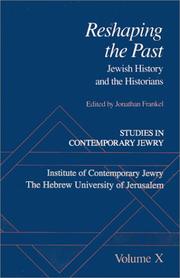
ISBN: 1280760680 0195357604 1423738942 9781423738947 9780195357608 0195093550 019771658X Year: 1994 Publisher: New York Published for the Institute by Oxford University Press
Abstract | Keywords | Export | Availability | Bookmark
 Loading...
Loading...Choose an application
- Reference Manager
- EndNote
- RefWorks (Direct export to RefWorks)
This collection of essays examines the dialogue between Jewish history and historiography in terms of changing national and popular myths, folk memory and the hidden consciousness of Jews in modern times.
Jews --- Hebrews --- Israelites --- Jewish people --- Jewry --- Judaic people --- Judaists --- Ethnology --- Religious adherents --- Semites --- Judaism --- History --- Social conditions. --- Political and social conditions --- Judaism and politics --- Zionism --- Holocaust, Jewish (1939-1945) --- Jewish historians. --- Antisemitism --- Zionism and Judaism --- Historiography. --- Israel
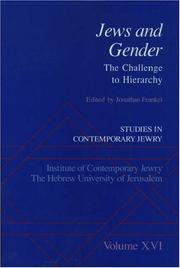
ISBN: 1280531150 0195349776 1429402210 9781429402217 0195140818 9780195140811 9781280531156 9780195349771 0197714056 Year: 2000 Publisher: Oxford ; New York : Oxford University Press,
Abstract | Keywords | Export | Availability | Bookmark
 Loading...
Loading...Choose an application
- Reference Manager
- EndNote
- RefWorks (Direct export to RefWorks)
The 16th volume in the Studies in Contemporary Jewry series features a symposium on the theme of Jews and gender. The articles show how a varied and controversial feminist approach can be applied to the field of Jewish studies.
Feminism --- Gender identity. --- Jewish women --- Jews --- Women in Judaism. --- Women in rabbinical literature. --- Women in the Talmud --- Rabbinical literature --- Judaism --- Hebrews --- Israelites --- Jewish people --- Jewry --- Judaic people --- Judaists --- Ethnology --- Religious adherents --- Semites --- Identity, Jewish --- Jewish identity --- Jewishness --- Jewish law --- Jewish nationalism --- Women, Jewish --- Women --- Sex identity (Gender identity) --- Sexual identity (Gender identity) --- Identity (Psychology) --- Sex (Psychology) --- Queer theory --- Jewish feminism --- Religious aspects --- Judaism. --- Social conditions --- Identity. --- Ethnic identity --- Race identity --- Legal status, laws, etc. --- Gender dysphoria --- Hebrew literature --- Sex role --- Yiddish literature --- History and criticism
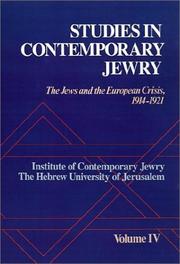
ISBN: 1280605286 9786610605286 019536404X 9780195364040 9780195051131 Year: 1988 Publisher: New York
Abstract | Keywords | Export | Availability | Bookmark
 Loading...
Loading...Choose an application
- Reference Manager
- EndNote
- RefWorks (Direct export to RefWorks)
This series is published yearly by the Institute of Contemporary Jewry at The Hebrew University of Jerusalem. It is edited by Jonathan Frankel, Peter Medding, and Ezra Mendelsohn, all distinguished professors of history at The Hebrew University. The volumes include symposia, articles, book reviews, and lists of recent dissertations by major scholars of Jewish history from around the world. Among the topics examined in this volume are the transformation of Russian Jewish communal life; Habsburg Jewry and its disappearance; the Bolsheviks and British Jews; and the Palestinian labor movement. Thi
Jews --- Hebrews --- Israelites --- Jewish people --- Jewry --- Judaic people --- Judaists --- Ethnology --- Religious adherents --- Semites --- Judaism --- History --- History.
Book
ISBN: 1280471301 0195353250 1602562733 9780195353259 9781280471308 0197716598 Year: 1998 Publisher: Oxford University Press, USA
Abstract | Keywords | Export | Availability | Bookmark
 Loading...
Loading...Choose an application
- Reference Manager
- EndNote
- RefWorks (Direct export to RefWorks)
This volume of the annual 'Studies in Contemporary Jewry' series presents essays on the origins of the Holocaust. 'The Fate of the European Jews', 1933-1945 provides multiple perspectives on the question of whether the Holocaust can best be explained as an inevitable result of Europe's anti-Semitic history, or as a tragic historical mutation.
Holocaust, Jewish (1939-1945) --- Jews --- Hebrews --- Israelites --- Jewish people --- Jewry --- Judaic people --- Judaists --- Ethnology --- Religious adherents --- Semites --- Judaism --- Catastrophe, Jewish (1939-1945) --- Destruction of the Jews (1939-1945) --- Extermination, Jewish (1939-1945) --- Holocaust, Nazi --- Ḥurban (1939-1945) --- Ḥurbn (1939-1945) --- Jewish Catastrophe (1939-1945) --- Jewish Holocaust (1939-1945) --- Nazi Holocaust --- Nazi persecution of Jews --- Shoʾah (1939-1945) --- Genocide --- World War, 1939-1945 --- Kindertransports (Rescue operations) --- Historiography. --- History --- Intellectual life --- Nazi persecution --- Persecutions --- Atrocities --- Jewish resistance --- Holocaust, Nazi (Jewish Holocaust) --- Nazi Holocaust (Jewish Holocaust) --- Nazi persecution (1939-1945) --- Historiography --- Book reviews.
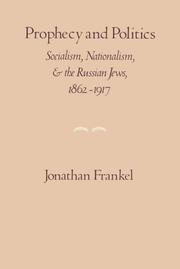
ISBN: 0511866275 0511572492 0521230284 0521269199 Year: 1981 Publisher: Cambridge : Cambridge University Press,
Abstract | Keywords | Export | Availability | Bookmark
 Loading...
Loading...Choose an application
- Reference Manager
- EndNote
- RefWorks (Direct export to RefWorks)
In the period from 1881 to 1917 socialist movements flourished in every major centre of Russian Jewish life, but, despite common foundations, there was often profound and bitter disagreement between them. This book describes the formation and evolution of these movements, which were at once united by a powerful vision and sundered by the contradictions of practical politics.
Jews --- Jewish socialists. --- Labor Zionism. --- Socialist Zionism --- Zionism --- Socialists, Jewish --- Socialists --- Politics and government. --- Russia --- United States --- Ethnic relations. --- Arts and Humanities --- History
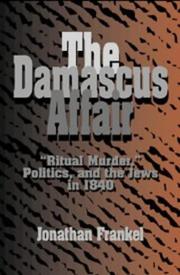
ISBN: 0521482461 Year: 1997 Publisher: Cambridge Cambridge University press
Abstract | Keywords | Export | Availability | Bookmark
 Loading...
Loading...Choose an application
- Reference Manager
- EndNote
- RefWorks (Direct export to RefWorks)
Blood accusation --- Jews --- Persecutions --- Damascus (Syria) --- Ethnic relations.
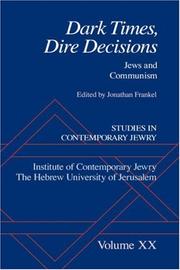
ISBN: 019029292X 1280428562 0195346130 142372223X 1602565619 9781423722236 9781280428562 9780195182248 0195182243 9786610428564 6610428565 9780195346138 0195182243 Year: 2004 Publisher: Oxford, [England] ; New York, New York : Oxford University Press,
Abstract | Keywords | Export | Availability | Bookmark
 Loading...
Loading...Choose an application
- Reference Manager
- EndNote
- RefWorks (Direct export to RefWorks)
Part of the ""Studies in Contemporary Jewry"" series, this title features essays on the varied and often controversial ways Communism and Jewish history interacted during the 20th century. It examines the relationship between Jews and the Communist movement in Poland, Russia, America, Britain, France, the Islamic world, and Germany.
Communism and Judaism --- Jewish communists --- Jews --- Communism --- Communists --- Judaism and communism --- Judaism --- History
Book
ISBN: 0521247136 0521090466 0511897308 Year: 1984 Publisher: Cambridge : Cambridge University Press,
Abstract | Keywords | Export | Availability | Bookmark
 Loading...
Loading...Choose an application
- Reference Manager
- EndNote
- RefWorks (Direct export to RefWorks)
Provides the English reader with a comprehensive study, based on first-hand documentary material, of Soviet policy towards the Jews of the USSR from the Stalinist era, through to the interregnum (1953-7), the Khrushchev period and the 'collective leadership' of Brezhnev, Kosygin and Podgorny (1964-7). In 1948 the State of Israel was established with the support of the Soviet bloc. But the period 1948-53 (the so-called 'black years'), also witnessed the murder of the actor Shlomo Mikhoels, the closing of the Jewish Anti-Fascist Committee, the liquidation of all Jewish cultural institutions, and the launching of the anti-cosmopolitan campaign and the 'Doctors' Plot'. After Stalin there were improvements in the policy towards the non-Russian nationalities, and even certain gestures of goodwill towards the Jewish population; but these proved to be more symbolic than substantive, and the Jews as individuals and as a national minority came to feel increasingly and inescapably trapped. Government restrictions, crude attacks on Judaism, Zionism, and on the State of Israel became regular features of the post-Stalin era.
Antisemitism --- Jews --- History. --- Arts and Humanities --- History --- Soviet Union --- Ethnic relations.
Book
Year: 1969 Publisher: Cambridge : Cambridge university press,
Abstract | Keywords | Export | Availability | Bookmark
 Loading...
Loading...Choose an application
- Reference Manager
- EndNote
- RefWorks (Direct export to RefWorks)
| Listing 1 - 10 of 21 | << page >> |
Sort by
|

 Search
Search Feedback
Feedback About UniCat
About UniCat  Help
Help News
News